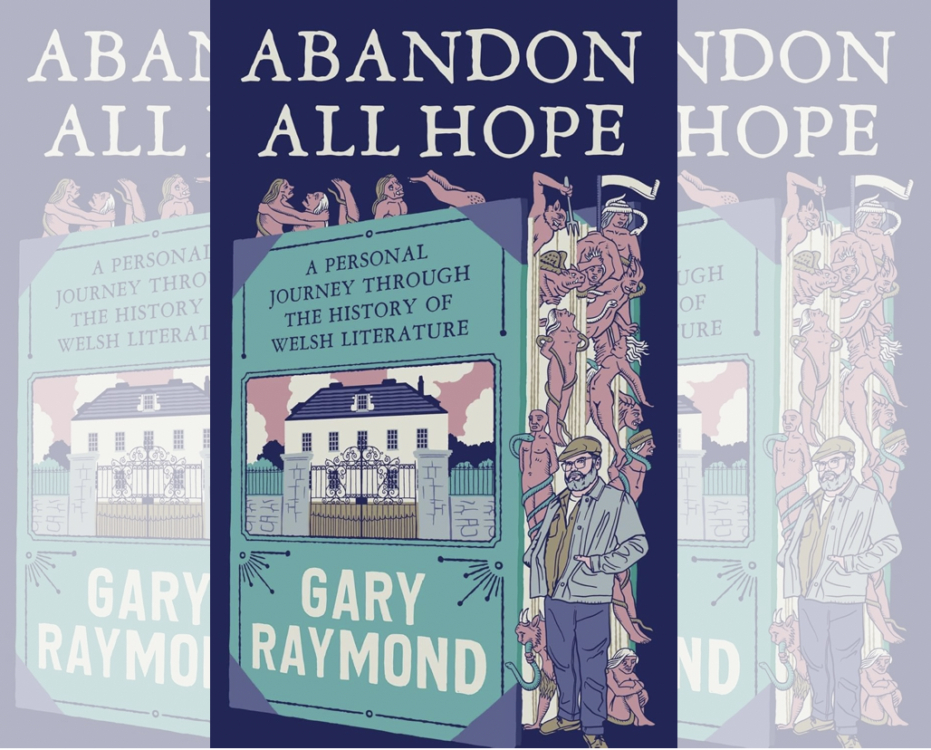Book review: Abandon All Hope by Gary Raymond

Niall Griffiths
It’s incumbent upon a reviewer to do more than enthuse about a book but occasionally (all too rarely, really) one comes across his/her desk regarding which it is difficult to do anything more and would that I had a longer available word-count to praise this extraordinary piece of work.
It’s wonderful. It perhaps casts its net a little too wide but even that carp carries its own rebuttal within it because of course it does, that’s kind of the point; it’s an extensive over-view of Welsh writing (or Writing in Wales, or whatever term might encapsulate the various literatures emanating from this little country) that avowedly explores those areas that other similar studies avoid (or deign not to visit).
It’s a trawl. It obviates the widest net possible.
Renaissance man
Anyway. You’ll probably have heard of Gary Raymond; novelist, critic, editor, presenter of the BBC Radio Wales Arts Show, co-founder of Wales Arts Review.
Bit of a Renaissance man, lot of a fine feller.
In Abandon All Hope he gives us, as the subtitle has it, A Personal Journey Through the History of Welsh Literature, and – as I’m sure you’ve gleaned by now – it’s a journey on which I was glad to be a passenger.
The template is Dante, with Raymond Williams as our Virgil, and Dorothy Edwards as our Beatrice (who, delightfully, we only tantalisingly glimpse: the ending of the primary text made me bark with laughter).
It echoes, in the endnotes, the Alastair Gray of The Book of Prefaces and, too, Vasari: the potted critical histories of an extensive cast of characters and concepts. It’ll teach you much.
The primary text is a descent into a fabulous and symbolic hell (or Uffern, of course).
There are diagrams by which to orienteer. There are guides to reading; you can refer sequentially to the endnotes or simply read it linear, or a mixture of both (as I did).
It has a distinctly non-academic flavour, as the opening symbol announces: our narrator awakens from a deep sleep under a tree outside a writer’s retreat (Ty Newydd in Llanystumdwy). Raymond Williams’s avatar beckons.
Experimentalists
We travel through Aberystdiss, which allows Gary to share with us his thoughts about its real-world counterpart (I’m sure you can hazard a guess) and they are thoughts worth listening to.
We meet a horde of Welsh writers (or writers based in Wales: Raymond has fun calculating the most accurate terminology); some of them you’ll be familiar with, some you may have on the fringes of your cultural consciousness, some may be entirely new to you.
We are taken to an open mic poetry reading: ‘truly this is hell’ (but do see the Endnotes here to see a qualification).
We are introduced to The Experimentalists and here I do have a misgiving; I found the concomitant endnote somewhat cheap, the satire too facile.
There are linguistic politics to Welsh poetic experimentalism, as there are to the work out of other countries host to minority languages, that are neglected here. But then, Raymond does address these concerns in other instances; the study of George Borrow, for example. The book’s effect is cumulative as well as immediate.
Lady Charlotte Guest appears, in a fascinatingly drawn encounter: ‘she gestured into the sky where the vapourous spectres…of The Mabinogion flew and glided and swooped. They seemed tormented, but also serene, weighted and full of air’.
And, shortly after this: ‘and here we are, having to sit through more Lords of the Rings nonsense. Or more Game of Thrones nonsense. And don’t even get me started on the MARVEL CINEMATIC UNIVERSE’.
This is engaging on so many levels – how the powers of myth become commodified and defused – as is the insistence on the necessary magic of Literature; the spirit of Kate Roberts, ‘Queen of our Literature’, says ‘no matter your politics or philosophy of life, writing is a solitary calling, and it can only be great art when it is personal and true and solitary in its ways.
Literature is only massive in the heart of the individual. Everything else is marketing’. So the dead writers still speak. And also: ‘Don’t forget the writing…It is magical, what we do….and magic is important’.
Two Thomases
We meet the two big Thomases: RS brings the storms; Dylan is a grotesque colossus. And I must mention the overall tone; Gary knows what he believes – culturally, politically, emotionally – and he’s clearly thought very long and very hard about such stuff.
He’s done his research. And yet he delivers it all in a non-dogmatic and non-imperious way, somehow implicitly, behind his non-declarative observations, acknowledging that behind his text hovers an acceptance of other views and educated takes. I’m not quite sure how he does it, but I’m glad he does.
As he says, in his deeply moving elegy to a gone friend: ‘his storytelling was the greatest act of communication. He inspired his students and his readers alike, and he believed above all else in the transformative power of art: the ability of art to change lives, to enrich, to edify, to make it all worthwhile’.
Abandon All Hope: A Personal Journey Through the History of Welsh Literature by Gary Raymond is published by Calon. It is available from all good bookshops.
Support our Nation today
For the price of a cup of coffee a month you can help us create an independent, not-for-profit, national news service for the people of Wales, by the people of Wales.




